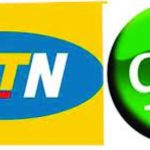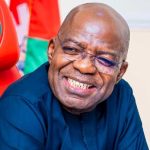NLNG repays N1.9trn shareholders loan

The Nigerian National Petroleum Corporation (NNPC), has commended the Nigeria LNG Limited (NLNG) on its successful repayment of 5.45 billion dollars (N1.98 trillion) loan on Train 1 to 6 investments.
Mr Andy Odeh, the Manager, Communications and Public Affairs of NLNG said Dr Maikanti Baru, the Group Managing Director of NNPC made the commendation in a statement in Lagos on Wednesday.
Baru spoke at a ceremony to mark the successful repayment of 5.45 billion dollars shareholders loan in London.
He said that NLNG sourced a total principal amount of 4.043 billion dollars from its shareholders in their respective shareholding proportions to partly fund the construction of Trains 1 to 6.
Baru said that the total capitalised interest in the shareholders loan was 1.411 billion dollars, which he said was in addition to the total principal drawdown of 4.043 billion dollars accounted for the total loan amount of 5.45 billion dollars repaid by the company.
The NNPC boss said that NLNG promptly serviced the shareholders loan with accelerated repayments made in the course of the loan, adding that the final principal amount of 35,135 billion dollars was promptly repaid on due date of Dec. 15, 2017.
According to Baru, after several false starts, the shareholders of NLNG took a Final Investment Decision (FID) of 3.31 billion dollars in 1995, for NLNG base project (Trains 1 and 2) with production capacity of 8 Million Tonnes Per Annum (MTPA) of LNG.
“This investment was wholly financed by shareholders through equity of 0.86 billion dollars and loan of 2.45 billion dollars.
“The project experienced rapid expansion, growing up to six trains by 2005 and production capacity of 22 MTPA of LNG and 5MTPA of NGLs (LPG and Condensates).
“With the shareholders investing a total loan of 5.45 billion dollars and equity of 1.13 billion dollars among other sources of financing.
“The investment in NLNG by the shareholders has multifaceted impact both locally and internationally re-echoing the company’s vision of being a world class company helping to build a better Nigeria.’’
Baru said that NLNG had contributed significantly to the reduction of gas flaring in Nigeria, reducing the adverse impacts of gas flaring on the environment and diversifying the revenue base of the nation.
He said that as at 2015, a replacement valuation of the trains stood at approximately 16 billion dollars from initial total project cost of 8.71 billion dollars.
He said presently, NLNG had generated revenues in excess of 25 billion dollars to the Federal Government, comprising of dividends of circa 17 billion dollars and taxes of 7.2 billion dollars.
According to him, this is a delight and a source of immense pride to the government and people of Nigeria, its host communities, the shareholders, financial markets and several other stakeholders.
He said NLNG had invested substantial funds in CSR activities from commencement of operations to date.
“About 150 million dollars had been contributed by NLNG for the on-going construction of Bonny – Bodo road by Julius Berger at a total cost of 300 million dollars with government funding the balance.
“The company has continually served as a dependable source of energy to the global market, moving its products practically to all continents around the world.
“NLNG takes great pride in its place as the fourth largest global LNG supplier which currently has six LNG trains with installed production capacity of 22 Million Tonnes per annum (MTPA) of LNG and 5MTPA of NGLs (LPG and Condensates).’’
Similarly, NLNG has awarded contracts for Front End Engineering Design (FEED) of its planned plant expansion project, Train 7, to B7 JV Consortium and SCD JV Consortium.
The statement also quoted Mr Tony Attah, the Managing Director of NLNG as saying “the front end engineering design is the most crucial part in the build-up to the actualisation of Train 7.
“Due to initial delay and lost opportunities to reinforce Nigeria’s position prominently on the global energy map.’’
Attah said that the contracts would make the company to realise its expansion goals of increasing liquefied natural gas production output from 22 Million Tonnes Per Annum (MTPA) to 30 MTPA.
According to him, the consortia are B7 JV Consortium, comprising American company KBR Inc., Technip of France and Japan Gas Corporation (JGC); and SCD JV Consortium.
He said that other consortia include Saipem of Italy, Japan’s Chiyoda and Daewoo of South Korea, which would participate in the Dual FEED Process and produce a Basic Design Engineering Package (BDEP) that would determine their EPC pricing, and eventually their bids to construct the train.
According to Attah, typically, FEED takes about 9 to 12 months but we have explored another strategy for this project by adopting the Dual FEED process which awards this crucial part of the Train 7 project to two prospective engineering consortia, instead of one contractor.
“What this does for us is give us a degree of freedom to start FEED and sometime after, EPC Bidding, with both activities overlapping. We remain committed to taking FID as soon as these processes are complete.
“The history of the LNG industry in Nigeria is chequered after about 30 years of trying to get an LNG project going.
“In 1989, NLNG was incorporated and one FID after the other, 6 trains were built in quick succession, making us the fastest growing LNG Company in the world at the time.
“But we lost steam just after 2007, while the rest of the world went past us with the development of their gas resources and the gain of greater market share.
“We started our LNG industry 24 months after Qatar, but Qatargas has attained a production capacity of 77 MTPA with additional target of 30% LNG production in the immediate future. I believe it is time to reset the narrative. It is time for gas revolution in Nigeria,’’ he said.
The News Agency of Nigeria (NAN) reports that NLNG is a private limited liability company owned by the Federal Government of Nigeria, with the Nigerian National Petroleum Corporation NNPC (49%) representation, Shell Gas B.V. (25.6%), Total Gaz Electricity Holdings France (15%), and Eni International (10.4%) (NAN)







